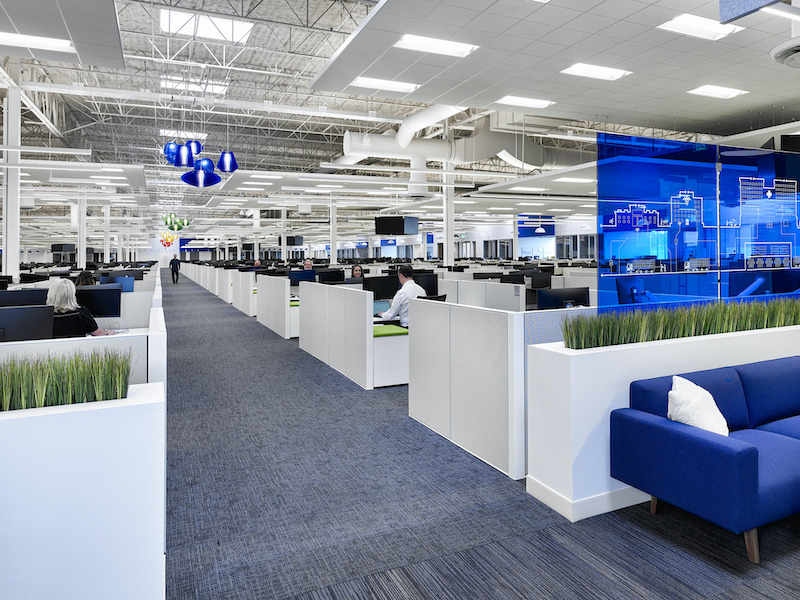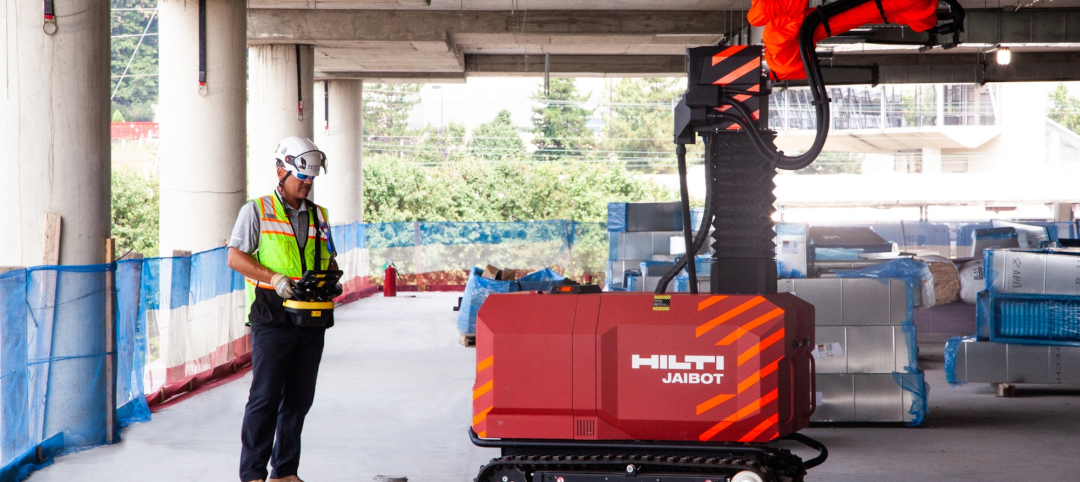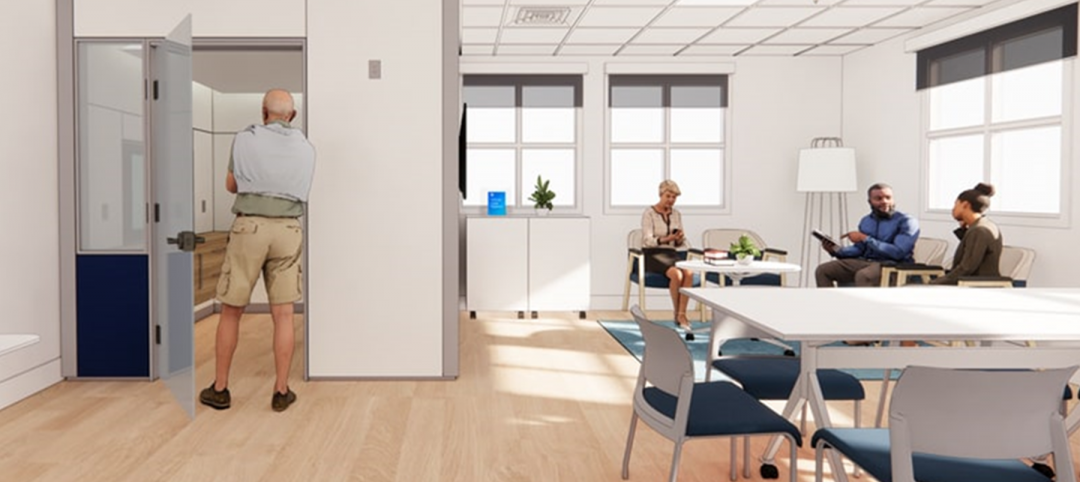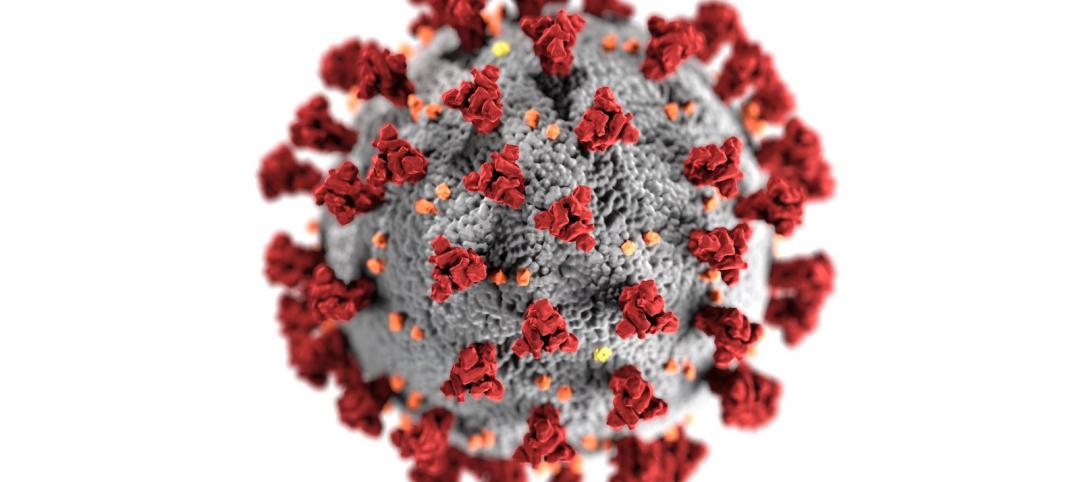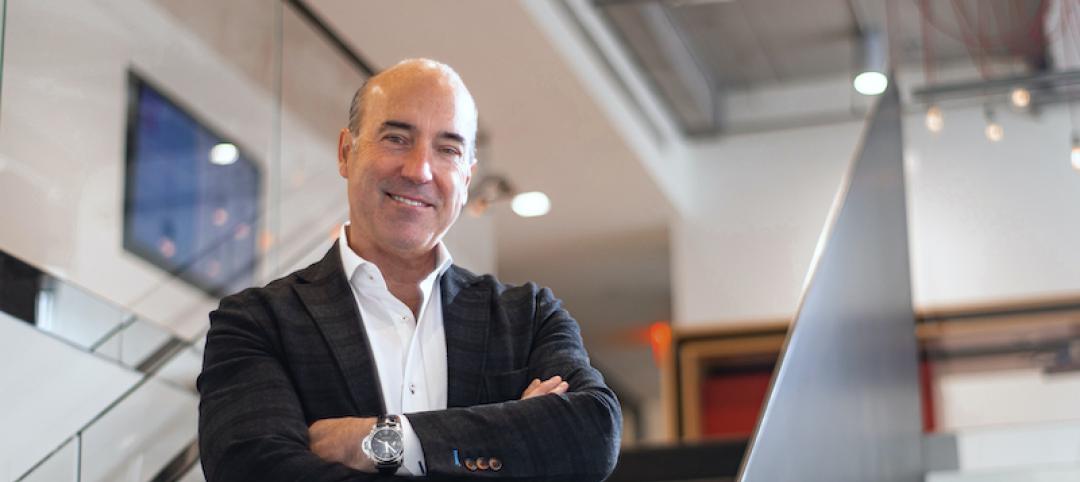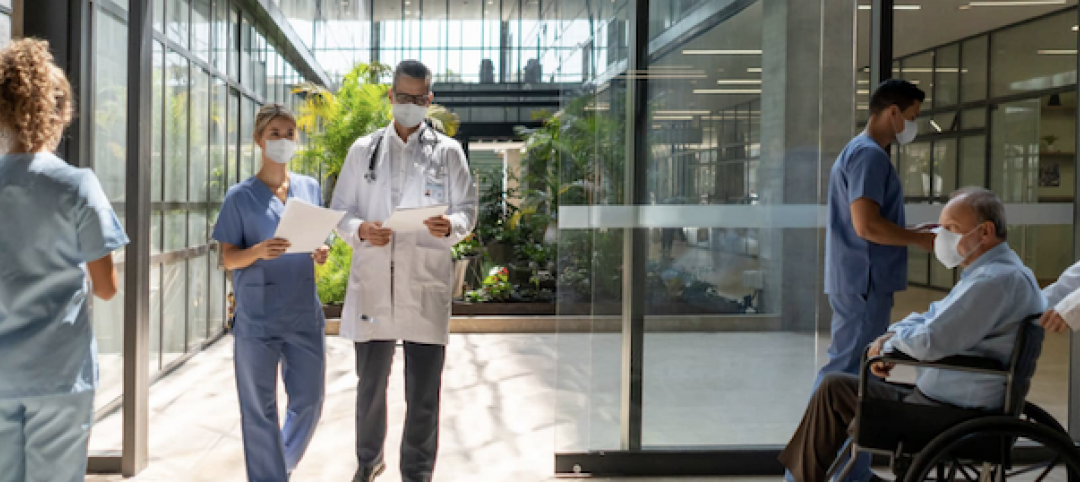As the coronavirus stubbornly persists in many parts of the U.S., COVID-19-specific buildings and products have been popping up in response.
Last January, Medline Industries, the largest privately held manufacturer and distributor of medical supplies in the U.S., started making face masks for the first time from a modified plant in Lithia, Ga., that, when fully operational later this year, will produce 36 million masks per month.
To support its core business units, Medline recently completed construction of a 130,000-sf, LEED-certified call center in Dubuque, Iowa, with over 1,000 workstations.
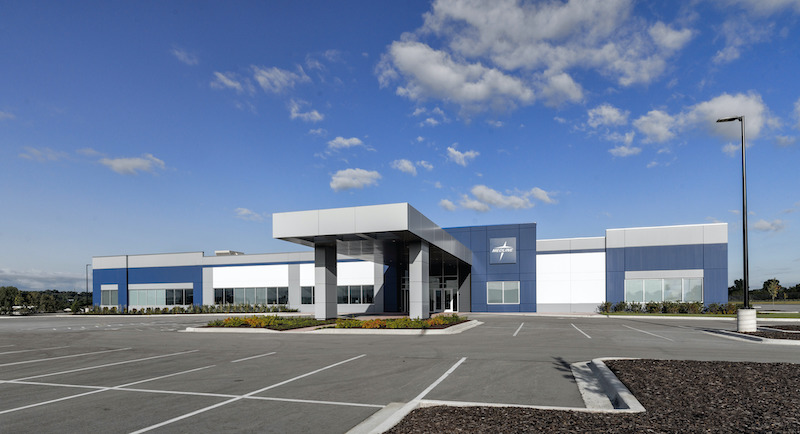 Medline's call center has over 1,000 workstations and is adding over 100 jobs to the market. Image: Charlie Mayer Photography
Medline's call center has over 1,000 workstations and is adding over 100 jobs to the market. Image: Charlie Mayer Photography
Working with the architecture design firm Ware Malcomb and general contractor Alston Construction, Medline’s goal for the call center was to create a “town within a town.” For example, adjacent to the cafeteria is a light-filled corner city center with access to an outside patio. A 5,200-sf gym/multipurpose room with a full-size basketball court is available to all employees. To encourage activity, the space includes a quarter mile track around the interior of the open office.
“It was our priority that the entire facility emphasizes connectivity and community,” says Dawn Riegel, Director, Interior Architecture and Design of Ware Malcomb’s Chicago and Oak Brook., Ill., offices. The call center added over 100 new jobs to the Dubuque market.
GETTING MORE PEOPLE VACCINATED FASTER
As of April 1, 29% of Americans had received one dose of the COVID-19 vaccine and 16% had received two doses, according to the Centers for Disease Control and Prevention. About 2.5 million people per day are being vaccinated, but the logistics of administering shots are still challenging for some municipalities and cities.
Among the solutions that have come onto the market is VaxMod, a modular system devised by the design firm Boulder Associates, which specializes in healthcare and senior living, and manufacturer The Boldt Company. VaxMod’s prefabricated units can provide safe and efficient COVID-19 vaccination settings for healthcare workers and individuals, and are set up for speedier delivery.
VaxMod consists of three modules, each 12- by 40-ft, although customers are allowed some tailoring. VaxMods can function as freestanding units or be connected to each other with segregated spaces for healthcare workers and patients.
According to The Boldt Company, VaxMod can vaccinate more than 1,100 patients per eight-hour shift with 27 full-time employees. That’s 39% more vaccines delivered per hour with 7% fewer staff than model vaccination clinics identified by the CDC. VaxMod is designed to handle both walk-in and drive-through patients, and is scalable to meet a specific community’s patient volume.
DRIVE THRU OR WALK-IN SERVCE
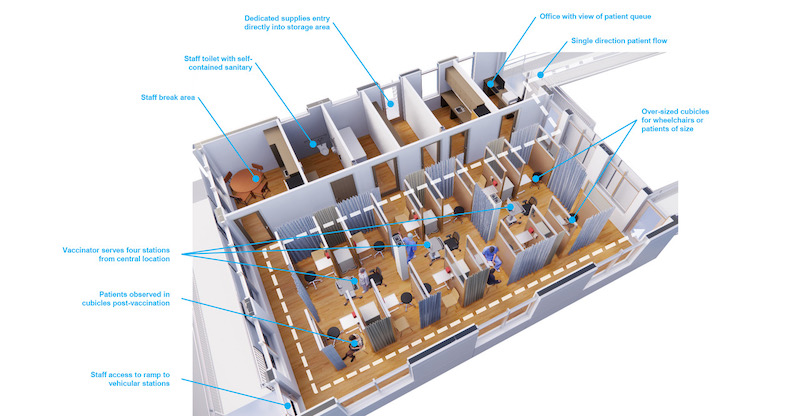 VaxMod is set up to deliver 1,100 vaccine shots during an eight-hour shift with only 27 workers. Image: The Boldt Company
VaxMod is set up to deliver 1,100 vaccine shots during an eight-hour shift with only 27 workers. Image: The Boldt Company
More precisely, VaxMod can be configured as a drive-through hub with a capacity for 104 vehicular vaccinations per hour. All traffic enters at one point for temperature and health screening. Individuals can check in and register for either walk-in or in-vehicle vaccinations. Canopies and covered stalls can be arranged in two loops around the central VaxMod, providing shelter for vehicles and resupply points for workers.
Simultaneously, VaxMod can serve 35 walk-in individuals per hour. Each unit houses 12 vaccination stations with specialized accommodations for individuals in wheelchairs. Individual cubicles are designed for privacy, social distance, and observation space after the vaccine is administered.
Boldt is cultivating sometimes of a specialty in the COVID arena. Last year, Boldt and the design firm HGA developed STAAT Mod, a prefabricated temporary hospital to help healthcare systems manage surge capacity during health crises. STAAT is short for Strategic Accuity-Adaptable Treatment, and the isolation rooms were designed with enough clearance for safe bed transfers, equipment, and a reclining chair. Boldt produces STAAT Mod and VaxMod modules in its Appleton, Wis., plant.
Also see: BD+C’s reporting on STAAT Mod
“Our experience in prefabrication means we can manufacture these facilities with better speed to market,” said Will Lichtig, executive vice president and chief of staff with The Boldt Company. “This allows us intense quality control, increased safety for our workforce, and the ability to meet an urgent need for healthcare organizations and our communities.”
Related Stories
Augmented Reality | Jan 27, 2023
Enhancing our M.O.O.D. through augmented reality therapy rooms
Perkins Eastman’s M.O.O.D. Space aims to make mental healthcare more accessible—and mental health more achievable.
K-12 Schools | Nov 30, 2022
School districts are prioritizing federal funds for air filtration, HVAC upgrades
U.S. school districts are widely planning to use funds from last year’s American Rescue Plan (ARP) to upgrade or improve air filtration and heating/cooling systems, according to a report from the Center for Green Schools at the U.S. Green Building Council. The report, “School Facilities Funding in the Pandemic,” says air filtration and HVAC upgrades are the top facility improvement choice for the 5,004 school districts included in the analysis.
Giants 400 | Nov 14, 2022
4 emerging trends from BD+C's 2022 Giants 400 Report
Regenerative design, cognitive health, and jobsite robotics highlight the top trends from the 519 design and construction firms that participated in BD+C's 2022 Giants 400 Report.
Healthcare Facilities | Jun 20, 2022
Is telehealth finally mainstream?
After more than a century of development, telehealth has become a standard alternative for many types of care.
Coronavirus | May 20, 2022
Center for Green Schools says U.S. schools need more support to fight COVID-19
The Center for Green Schools at the U.S. Green Building Council released a new report detailing how school districts around the country have managed air quality within their buildings during the second year of the COVID-19 pandemic.
Industry Research | Mar 9, 2022
Survey reveals five ways COVID-19 changed Americans’ impressions of public restrooms and facilities
Upon entering the third year of the pandemic, Americans are not only more sensitive to germs in public restrooms, they now hold higher standards for the cleanliness, condition and technology used in these shared spaces, according to the annual Healthy Handwashing Survey™ from Bradley Corporation conducted in January.
Codes and Standards | Feb 21, 2022
New standard for ultraviolet germicidal irradiation
The Illuminating Engineering Society (IES) recently introduced the standard, ANSI/IES RP-44-21 Recommended Practice: Ultraviolet Germicidal Irradiation.
Coronavirus | Jan 20, 2022
Advances and challenges in improving indoor air quality in commercial buildings
Michael Dreidger, CEO of IAQ tech startup Airsset speaks with BD+C's John Caulfield about how building owners and property managers can improve their buildings' air quality.
Coronavirus | Jul 20, 2021
5 leadership lessons for a post-pandemic world from Shawmut CEO Les Hiscoe
Les Hiscoe, PE, CEO of Shawmut, a $1.5 billion construction management company headquartered in Boston, offers a 5-point plan for dealing with the Covid pandemic.
Resiliency | Jul 15, 2021
A new report urges federal investment in healthier buildings
The National Institute of Building Sciences also calls for code changes and greater cooperation between building owners and the AEC community.


